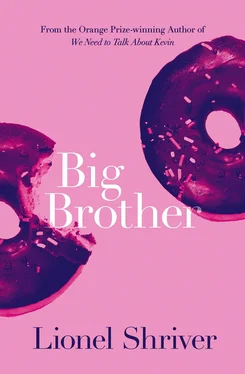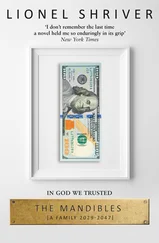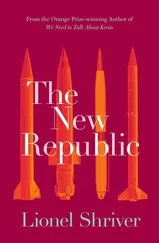Word of mouth no longer depends on gabbing over a picket fence, and with the aid of the Internet the customized pull-string doll business went viral. By that year’s end, I had folded Breadbasket, and Baby Monotonous—though thanks to Fletcher’s goading misnomer some locals believed Baby Moronic was my company’s real name—had headquarters outside New Holland and a full-time workforce. The formula was irresistible: ridicule paired with affection. And while expensive to make, the dolls were far more expensive to buy. Besides, they’d not have been so popular if they were cheap. Costing about the combined price of a KitchenAid mixer and a top-of-the-line Dyson, a Baby Monotonous doll had become a status item, one by popular accord more rewarding than the average vacuum cleaner.
Aptly for the last father-son interchange, the third time Cody pulled the doll’s string it declared with exalted sanctimony, I want DRY toast! I want DRY toast!
Both kids fell about laughing.
“I’d like to know why that thing never stops being funny,” said Fletcher.
“Doesn’t matter why,” said Tanner, struggling to stand up straight. “They’re always funny, they only get funnier, and that’s why Pandora is rich.”
“We’re not rich,” I said. Leaving aside my stepson’s inflated assessment of our family’s circumstances, rich was a word for other people, and generally for those one doesn’t like. “We’re only doing okay. And be sure not to say anything like that around your uncle.” I corrected with an eye roll, “Step-uncle.”
“Why not?” asked Tanner.
“It’s impolite to talk about money. And your uncle Edison seems to have fallen on tough times. You don’t want to rub it in.”
Tanner looked at his stepmother sideways. “You don’t want him to tap you.”
“I didn’t say that.”
“Didn’t have to.” Tanner may have overestimated his literary gifts. But he was pretty smart.
Driving to Cedar Rapids Airport, I wondered how four years could have passed, the longest Edison and I had been apart. We had talked on the phone—though more than once his number had been suddenly out of service. He was constantly shifting digs, and often away on tours of Europe, South America, or Japan. It was up to me to track him down by calling other musicians like Slack. Exasperation that my older brother didn’t keep up his end of our relationship was pointless. He always sounded happy to hear my voice, and that’s all that mattered to me.
In the flurry of ordering bolts of fabric and bales of cotton stuffing, maybe it was little wonder I hadn’t seen Edison. While establishing my headquarters, hiring actors for the recordings, taking on yet more staff to handle orders and ensure that the portly doll with the hard hat that demanded, “Where’s my grub?” went to Lansing, Michigan, and not to Idaho, it had been tricky to remain attentive to Fletcher, Tanner, and Cody, or even to fit in phone calls to family farther afield. Although one call three years back had sounded fractionally off-key. My product had just begun to capture the popular imagination, and I was still excited; why, my pull-string dolls were apparently all the rage among the upper crust in my brother’s own city, having just been the subject of New York magazine’s lead story, “Monotonous Manhattan”—with inset scripts of Donald Trump and Mayor Bloomberg dolls. But the tone with which Edison congratulated me on my appearance on that cover had disinclined me to dial again soon. All the words were in the right place, and the slight sneering or testiness might have been in my head; you could never quite trust the phone.
Since then, for me Monotonous had become too successful—meaning, all that remained was for the enterprise to become less so. Only a tipping point awaited, beyond which orders would decline. It wasn’t a “problem” with which I expected others to sympathize, but recently I’d been suffering from an insidious lassitude that derived from having everything—more than, really—I had ever wanted. On the personal side, I had found Fletcher Feuerbach, to others tightly wound, but warmer and funnier behind closed doors than most suspected. (Stripped, he was a surprisingly handsome man, and he had once said the same of me: we were “stealth attractive.”) I’d had none of my own children, but my adoptive ones were still speaking to me, which was more than could be said of the average teenager one had borne; I’d skipped the bawling-baby stage of childrearing, and gotten in on the best part. On the career side, I had never been ambitious, and suddenly I headed a thriving business of the most improbable sort: one with a sense of humor. I’d made just enough money that the prospect of making a little more left me cold.
Wise high-flyers kept this battle with the baffling flatness of success discreetly to themselves. Picture how bitterly hordes of the frustrated, disappointed, and dispossessed would greet any complaint about being too satisfied and too wealthy. Be that as it may, it really isn’t a very nice sensation to not want anything. Thwarted hopes are no picnic, but desire itself is energizing. I had always been a hard worker, and this damnable repleteness was enervating. Without a doubt, there was only one solution to my growing torpidity, my Thanksgiving-dinner stupor writ large:
I needed a new project.
Brown with elegiac hints of yellow, cornfields drying for the October harvest slipped past my window. Overland electrical cables scalloped rhythmically by on creosoted poles, while globular water tanks on narrow stems glowed in autumnal sun like giant incandescent lightbulbs. The pastoral effect was blighted by big-box stores and strip malls—Kum & Go, Dollar General, Home Depot, and the recent explosion of Mexican restaurants, while as ever the Super 8 bannered in garish black-and-gold plastic: GO HAWKEYES, SUPPORT OUR TEAM! Yet on pristine stretches the countryside expressed the timeless groundedness and solidity that had captivated me as a child on visits to my paternal grandparents: white clapboard, potato crops, the odd horse. Whatever foofaraw was roiling the rest of the country always seemed far away.
Since then, Iowa had changed. A wave of illegal immigrants had arrived to work in the pork-processing plants. State politics had grown a febrile right-wing fringe. Most family farms of the sort my grandparents tilled had long ago been sold or rented to agribusiness, so that numerous farmhouses, barns, and outbuildings along this route had collapsed. The crop already subsidized to the hilt, more than half of that corn would be converted to ethanol—netting still more lucrative federal subsidies and so slathering a whole second layer of corruption on a grain once a byword for wholesomeness and a hokey sense of humor. The subdued isolation that was soothing to me was soporific to modern young people, for whom the anonymity in which I wallowed was swallowing. Just like my father in his youth, my stepson was frantic to get out.
By contrast, Fletcher was born in Muscatine, and his never having moved from his home state didn’t signal a lack of imagination; rather, a contented acceptance and even a certain profundity. “Iowa is somewhere,” he said once, “and that’s as much as anywhere can claim.” The modesty of the Midwest, its secure, unpretentious self-knowledge, its useful growth of crops that people ate as opposed to the provision of elusive “services,” appealed to us both.
Nearing the airport, I looked forward to having Edison around again—finally, company with appetite . My brother had been imbued with all the verve, the flair, the savoir faire that I lacked. Tall, fit, and flamboyant, he’d inherited our father’s Jeff Bridges good looks without also assuming the oiliness that had always contaminated Travis. Edison’s younger features were fine, almost delicate, and last I’d seen him the somewhat broader lines of his face at forty still hadn’t buried the high cheekbones. He kept his dirty-blond hair just long enough to flare into an unruly corona around his crown. The manic keyboard of a smile glinted with a hint of wickedness, the predatory voracity of a big cat. In my early teens, my misfit friends were always smitten with my brother. He had an energy, an eagerness, a rapacity; even into adulthood, he never hugged me without lifting me off the floor. Edison was bound to breathe some life into that vast blank house on Solomon Drive, a residence that, since the advent of Fletcher’s mad cycling and cheerless diet, had erred on the grim side.
Читать дальше












